Why do dogs pant? Why is my dog panting so much? Why is my dog panting for no reason?
On a hot day or even a warmish day, my dogs will pant all the time.
I have a breed that pants a lot because they get warm, even when it’s snowing outside.
Regular panting for them is normal, however when their panting is excessive and/or combined with other symptoms, then it’s a lot more serious.
Let’s take a look at some more common reasons why dogs pant and if it’s normal or abnormal behavior.
Why Is Your Dog Panting?
- They’re hot
- They’re excited
- Stress
- Anxiety
- Pain
- Injury
- Medical condition
You might think that your dog is panting for no reason but panting is a common behavior in dogs and some do it more than others.
Knowing why your dog is panting, because they are hot, excited or in pain is important information that you need to know so you can determine if something else is going on.
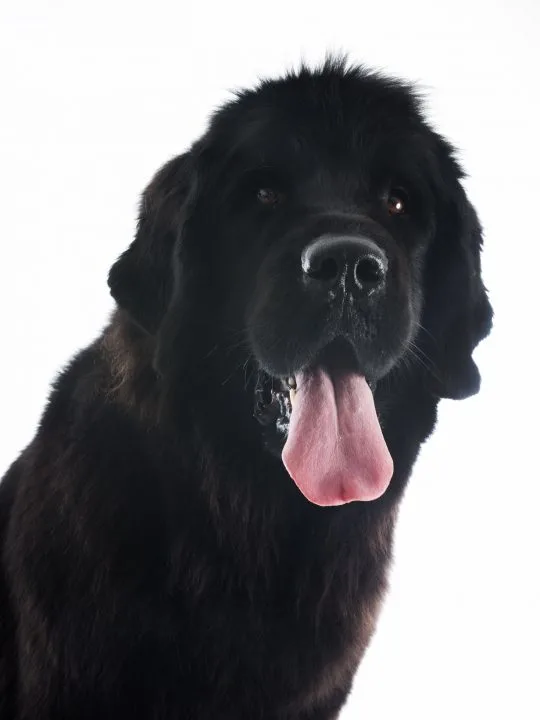
Panting in dogs is when a dog breathes with an open mouth and in some cases, its tongue might hang a little or a lot out of its mouth.
It’s like open-mouth breathing and it’s how dogs control their body temperature.
Most dogs pant when they’re hot because they don’t sweat like humans do.
Sure, they sweat a little through their paw pads but not much which is why they pant.
Panting allows for a dog to release heat from their body.
Breeds like the Newfoundland that have a thick fur coat pant a lot because they’re hot most of the time, even in the winter!
Panting is different than labored breathing and the two shouldn’t be confused.
While some breeds like the Newfoundland might pant every day, other breeds will usually pant for the following reasons:
Most dogs pant to cool down.
Panting allows a dog to release heat from their body.
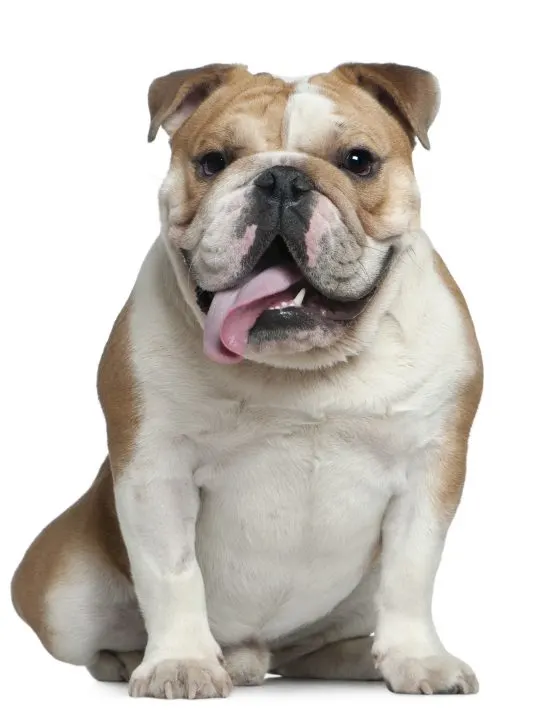
For some dogs, this is an easy process but for dogs that have short faces like French Bulldogs and English Bulldogs, they might pant more.
If a dog gets overheated it will exhibit excessive panting.
In the summer months, it’s important to make sure that a dog doesn’t get too overheated because it can lead to heatstroke.
Other signs of heatstroke can be:
- Bright red gums
- Drooling (thick salvia)
- Collapse
- Vomiting
- Sunken eyes
- Dehydration
To avoid heatstroke in dogs, never leave them locked in a dog on a hot day, in the summer exercise in the morning or at dusk, never leave them outside for prolonged periods of time, and always provide shade and fresh, cool water for your dog.
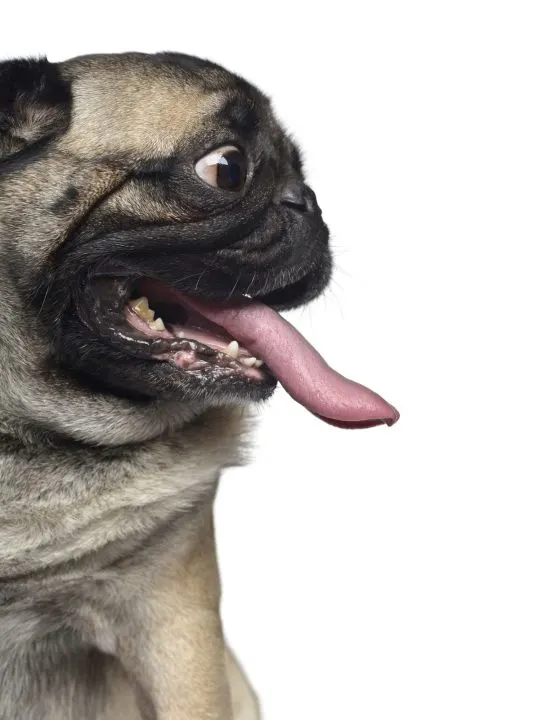
Excitement
While being hot is the most common reason that dogs pant, that’s not the only reason.
Many healthy dogs will pant when they’re excited.
For example, if your dog hears the word, “walk” or “car rides” it might get excited and start wagging its tail, pacing and panting.
They’ll look happy which means that their eyes will be alert, their butts will be wiggling and they might even let out a few happy barks.
Once the excitement is over and they’re relaxed and the panting will stop.
This is why it’s so important to pay attention to your dog’s body language.
Stress and Anxiety
Many dogs will also pant when they’re stressed, fearful or suffering from anxiety.
Panting that is related to stress is often due to going to the vet, getting their nails trimmed, loud sounds like thunder or fireworks and separation anxiety.
Other signs of stress in dogs are tail tucked, hiding, pacing and even crying or whining.
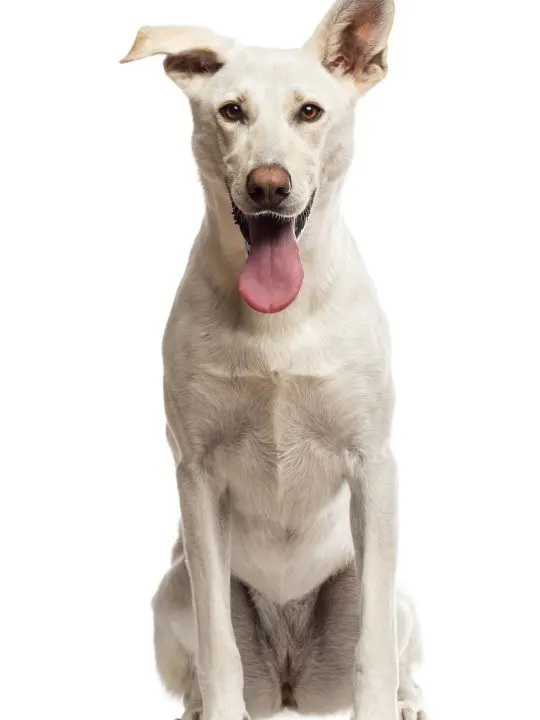
Pain or Injury
Most dogs are pretty stoic which means they don’t show pain like humans do.
One way to spot if a dog is painful or uncomfortable is panting.
If you think that your dog is panting due to pain you’ll also want to look out for other symptoms such as:
- Vomiting or diarrhea
- Loss of appetite
- Lethargy (sleeping more than normal)
- Limping
- Restlessness
- Swelling in limbs or abdomen
- Trembling
- Biting or licking at one specific area of their body
If your dog is panting, has a swollen stomach, is vomiting foam and pacing it could be a sign of dog bloat/GDV.
This is a medical emergency and you should take your dog to the vet immediately.
If you think that your dog is panting because they’re in pain you should contact your veterinarian.
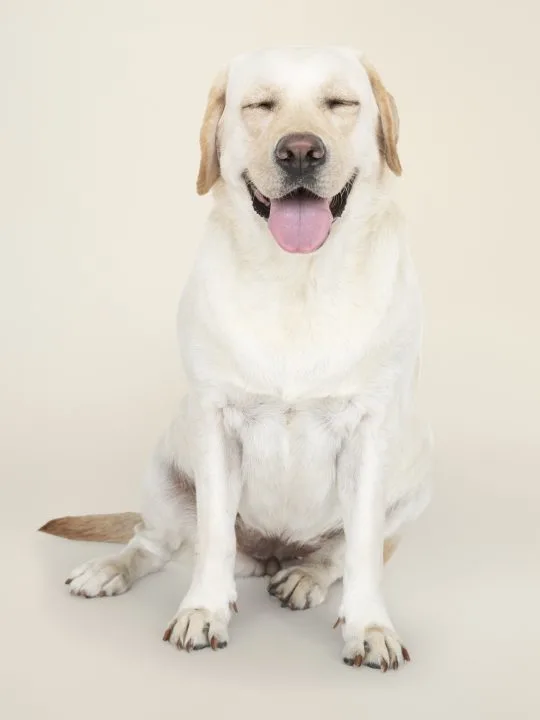
Medical Conditions That Cause Dogs To Pant
Along with being hot, excited, stressed or in pain, there are quite a number of medical conditions that can cause a dog to pant also.
Some of the more common medical issues include:
- Fever. A dog can get a fever for many reasons like a virus, parasites, tick exposure, tooth infection, infected wound, or ear infection.
- Medications. Some of the more common medications that can cause a dog to pant are steroids like Prednisone and some heart medications.
- Bloat. Bloat or GDV is a medical emergency. While any dog can suffer from bloat it is mostly seen in dogs with a deep chest like Boxers, Great Danes, Newfoundlands…etc.
- Exposure to poisons. A dog that has been exposed to a toxin or something poisonous like backyard mushrooms or households cleaners might pant, drool, vomit and become lethargic.
- Cushing’s disease. Cushing’s disease is a condition that is caused by the excessive production of cortisol. Along with panting it can cause a distended abdomen, increased thirst, hair loss, increased appetite and more.
- Respiratory Conditions. Some respiratory conditions that cause panting are laryngeal paralysis, pneumonia and tumors on the lung. LP is a common condition in Newfies and other breeds where the muscles that open and close the larynx at the back of the throat are weakened or paralyzed. The panting is often accompanied by a wheeze and a change in their bark.
- Heart Failure. Dogs that are suffering from heart failure may pant a lot and also cough. They can also have exercise intolerance and experience shallow breathing.
- Allergic reaction. If a dog has an allergic reaction to a medication, a bee sting or something that they’ve come into contact with, they might experience panting.
- Obesity. Overweight dogs will often pant more because they’re carrying around more weight than their body was made for.
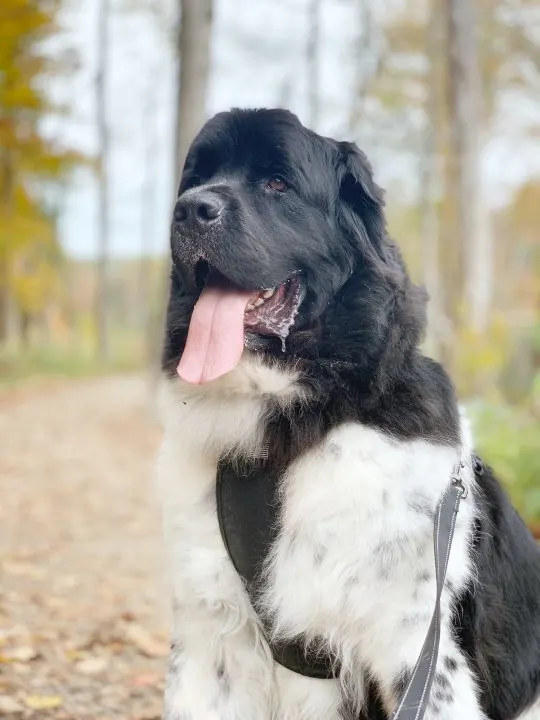
How Can You Tell Normal Dog Panting From Excessive Panting?
When you have a dog that normally pants a lot it can be hard to tell what is normal panting and what is not.
Having Newfoundlands, this is often a struggle so here are some ways I determine what is normal panting for my dogs:
- Look for other symptoms. Are my dogs acting normal? Are they eating and drinking normally? Are they coughing? Any vomiting or diarrhea? Have I removed a tick recently? Are they limping? Vomiting? (I will always check to see if their stomach is distended because I’m paranoid of dog bloat)
- Normal panting. Does their panting sound normal? Are they wheezing? Coughing? Normal heart rate? Normal respiratory rate?
Basically, I’m looking for any other symptoms they might be showing me which is why it’s always important to stay tuned in to your dog’s behaviors.
When in doubt always call your vet!